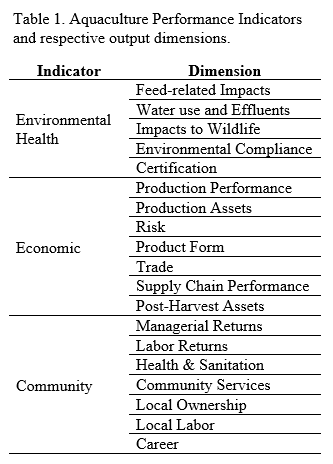AQUACULTURE PERFORMANCE INDICATORS
Currently, there are no consistently collected data documenting performance of aquaculture industries in the US and globally in terms of economic, social and environmental success. We draw on theory and practical knowledge to develop an extension to the Fishery Performance Indicators (FPIs) called the Aquaculture Performance Indicators (APIs). The Fishery Performance Indicators have been successfully used in a broad range of applications to compare global fisheries in environmental, economic and community performance, analyze species-specific complexes, and evaluate the effectiveness of investment and reforms. The APIs build upon the success of the FPIs to measure performance of aquaculture industries in economic, environmental, and social dimensions and to test hypotheses on inputs that lead to success or failure of a given aquaculture sector.
The APIs use 88 performance metrics that can be aggregated into three key sustainability indicators: environmental health, economic and community (Table 1). The metrics are also designed to be readily available, accurate, quantifiable, and relevant . Sixty-six input metrics are also scored which enable analysis of factors enabling or hindering achievement of environmental, economic and community outcomes. Input metrics reflect aquaculture management practices and broader enabling factors such as the quality of the management system, property rights system, and market conditions.
Data on more than 30 aquaculture industries around the world have been collected . This paper will introduce the novel API tool and summarize the preliminary findings of the initial case studies.
